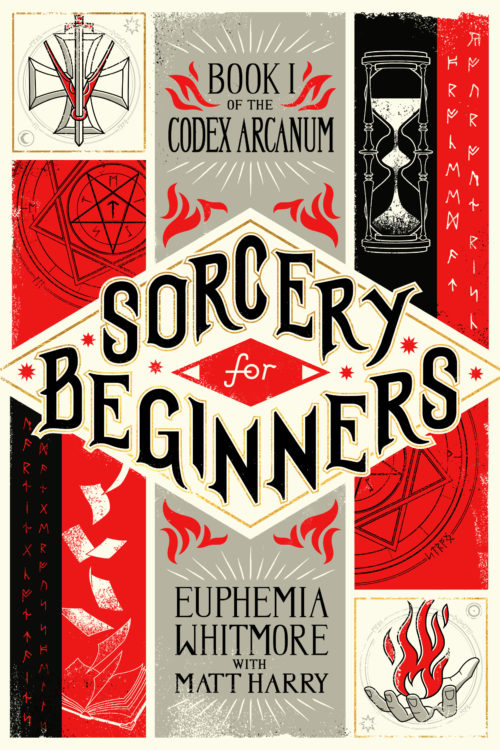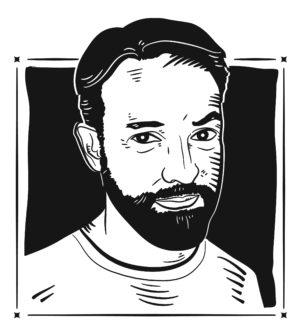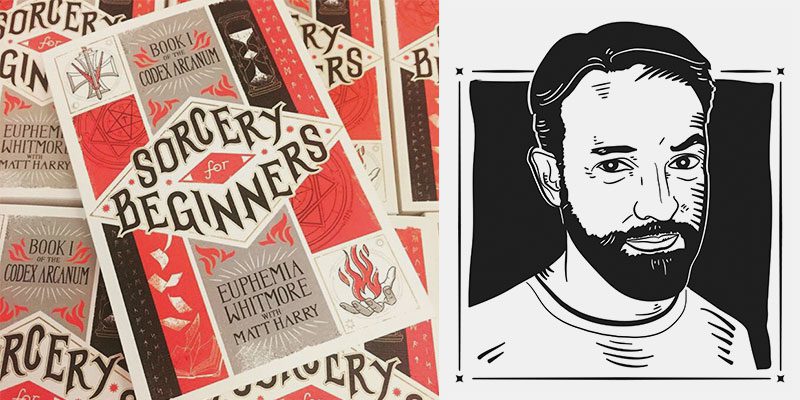By Matt Harry, author of Sorcery for Beginners
Bullying plays a key part in my debut novel Sorcery for Beginners.
The main character, Owen Macready, is 13-years-old and the new kid at his school in Henderson, Nevada. He just wants to keep his head down, but one day, he encounters three kids menacing a seventh grader and he calls them out. The bullies give chase, and Owen hides from them in a magic bookstore, where he acquires a how-to guide to spell-casting called — you guessed it — Sorcery for Beginners. From that moment on, school bullies are the least of his problems.

I decided to use bullying as a story catalyst for several reasons. First, I dealt with bullies when I was 13, so it was a scenario I knew. (I even named the bully in my book after my middle school bully.) Secondly, I have two young boys and I wanted to explore a theme that’s central to the experience of being a kid. According to a recent psychology study at UCLA, bullying is still pretty prevalent in schools — 29% of students in grades 6 to 12 admit to being bullied in some way, while 70% of students say they have witnessed bullying. Eighty-three percent of girls and 79 percent of boys say they have been bullied in school or online.
So, writing the book was cathartic — my characters get to use magic to deal with bullies in a way that I and my children never could. But for those of us who don’t have access to supernatural help guides, how do we handle bullying in real life?
As the father of a second grader, I’ve already had several discussions with my son about bullies—both dealing with them and how to avoid becoming one. Unfortunately, bullying seems to go hand-in-hand with growing up. And because we can’t stop it with a magic spell, we have to deal with it more pragmatic ways.
While I’m by no means an expert, I do have decades of experience in this area. Not only was I bullied in school, but to my shame, I also did some bullying of my own (mostly verbal, as I’m not really the ‘intimidating muscle’ type). I’ve written about bullying in works of fiction, and now I’m dealing with it from the perspective of a parent. Here are the lessons I’ve personally learned while trying to address bullying:
- Never shame the victim. One of the worst responses to bullying can be to place judgment on the behavior. Calling out a victim of bullying (“Why didn’t you say anything?” “Stand up for yourself!” etc.) can make the kid feel worse, and will definitely make them more self-conscious the next time they have a similar encounter.
x - Don’t judge the bully. While we might want to place blame, saying “what’s wrong with you?” will only make them shut down. Kids bully because they’re in the process of learning empathy. Either they’re testing limits, or lashing out because they themselves are bullied. Instead of grilling them for their actions, try listening objectively to what happened, discuss how it made the people involved feel, and talk about more appropriate behaviors they can try next time.
x - Don’t encourage violence. As cathartic as it can be to watch a bully get laid out by an underdog in books (I have several such scenes in Sorcery for Beginners), in the real world violence usually leads to more violence. We’re not apes anymore; part of becoming an adult human is to learn how to deal with adversity without resorting to fisticuffs. However, if your kid continues to be physically menaced, self-defense classes may give them the tools they need to protect themselves and be more confident.
x - Do encourage kids to (verbally) stand up for themselves and others. When I was a teenager, I was bullied pretty solidly for about three years. Mostly it was low-key stuff: kids would vandalize my bike, sucker-punch me in the locker room, or call me various degrading iterations of my last name. (‘Harry’ is tailor-made for some solid burns.) But what made it finally stop was when I learned to fire back funny responses. Nothing disarms a bully like a calm, well-crafted comeback. (“Wow, did you pay someone to write that joke?” is a personal favorite.) If quips aren’t your kid’s thing, try an honest appeal to the bully’s humanity. (“What would your grandmother say if she could see you now?” can really get them thinking.) You can even work with your child to craft such responses ahead of time, so they’ll be prepared if the situation arises. Bullies don’t expect to be challenged. A big part of my eldest son’s karate training focuses on AVOIDING fights. A confident battle cry can defuse a situation before it blows up.
x - If all else fails, walk away. Bullying is like a fire — it needs fuel to keep going. Getting upset, shouting snarky comebacks, or even ignoring a bully can sometimes convince them to keep going. But telling your kid to remove his-or-herself from the situation can short-circuit a bully’s momentum. After all, a flame can’t burn without oxygen.
x - Teach kids “this too shall pass.” Even the smallest social issues can seem world-ending when you’re a teenager. Only after you grow up do you realize that your “problems” were temporary and minor compared to real trauma. And while it’s tough to imagine a rosy future when faced with a painful present, just keep reiterating that one day, your kids will be doing what they want with their lives, and the encounters they’re having in school will be a small bump in the road.
x - Finally, communicate with your kids. Let them know about times you were bullied, or about bullying you witnessed. Teach them that they’re not alone. They’re going through a tough time, but they should never have to do it by themselves. Convince them that someone – a relative, a friend, a teacher at school – is always willing to listen. Often, that’s all we need to pull us out of a dark place.
With these lessons in hand, kids won’t need Sorcery for Beginners to fend off bullies. We might not be able to stop the practice, but we can help young people deal with it in a more positive way. And no magic spells are required.

Matt Harry received an MFA in Film Production from USC’s School of Cinematic Arts, and has worked as a filmmaker, editor, screenwriter, college professor, movie critic, and story consultant. His writing has been published in the Cleveland Plain Dealer, the Akron Beacon-Journal, and the textbook The Elements of Style. He lives in Los Angeles with his wife and two sons. Sorcery for Beginners is his first novel.



